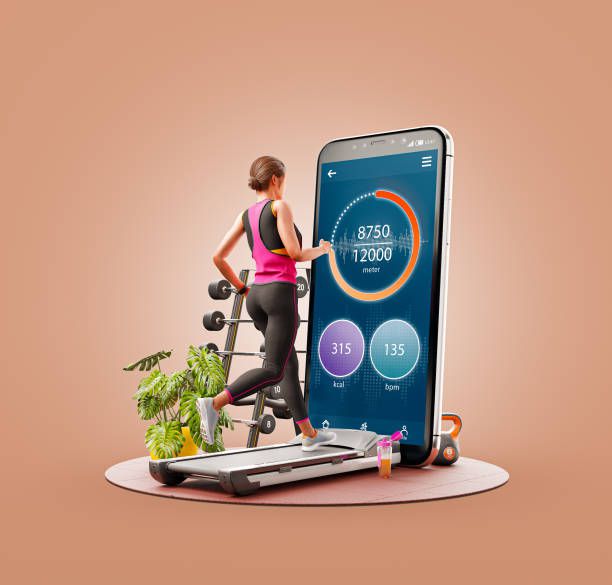
In Nigeria today, it’s easy to see how hard it is to keep up with fitness. Between long commutes, demanding jobs, and rising gym fees, staying consistent with workouts feels almost impossible. But here’s something most people don’t realise, your smartphone could be the most reliable fitness coach you’ll ever have.
It’s not just for selfies or scrolling through social media. Hidden inside that small device are tools designed to track your steps, remind you to move, log your meals, and even monitor your sleep and mental health.
In a country where finding time (and money) for fitness can be tough, phones are quietly becoming Nigerians’ personal trainers, right in their pockets.
1. The Fitness Tracker in Your Pocket
Every modern smartphone now comes with features built to support health tracking. The same device you use to text and take pictures can also tell you how active you’ve been.
For Android users, Google Fit automatically counts your steps and records movement throughout the day. Samsung users have Samsung Health, a tool that tracks workouts, calorie intake, heart rate, and even sleep. iPhone users can rely on Apple Fitness and the Health app, both designed to track everything from your walking distance to your breathing patterns.
These tools don’t just collect numbers, they give feedback. They help you understand your daily habits and push you to move more, rest better, and eat smarter.
Imagine this: you spend your day walking to the bus stop, hustling through Lagos traffic, or pacing around the office. Your phone is quietly recording it all, helping you hit your daily fitness targets without ever stepping into a gym.
2. Free Fitness Apps
You don’t need to buy fancy gadgets to start your fitness journey. There are countless free fitness apps Nigerians already use to stay healthy.
-
Google Fit: Simple and easy, perfect for beginners who just want to count steps and monitor activity levels.
-
Samsung Health: Comes pre-installed on many Samsung phones, allowing users to log meals, workouts, and even stress levels.
-
Apple Fitness: Integrates seamlessly with Apple Watch for advanced tracking, but also works well on iPhones.
-
MyFitnessPal: Excellent for calorie tracking and setting diet goals.
-
Nike Training Club and Adidas Running: Offer guided workouts and training challenges for those who want structure.
These apps use AI-driven insights to give you tailored advice, whether it’s suggesting a new workout routine, reminding you to drink water, or celebrating your progress.
And because most of them are free or have optional paid upgrades, they’re accessible to many Nigerians trying to live healthier without breaking the bank.
3. Siri, Google Assistant, and Your Smartwatch— Your Ultimate Fitness Team
If you’ve ever had your Google Assistant or Siri remind you to move, stretch, or rest, then you’ve already used AI in fitness.
Artificial intelligence is shaping the way we interact with health data. AI can analyse your activity patterns and suggest when to exercise, how much to walk, or when to take breaks.
For those with smartwatches or fitness bands, this connection goes even deeper. Devices like Samsung Galaxy Watch, Apple Watch, and Fitbit monitor your heart rate, track your workouts in real-time, and even detect when you’re under stress.
But even without wearables, your smartphone alone can track your steps, estimate calories burned, and help manage daily activity goals. It’s a smart, personalised system that adjusts to your lifestyle, something traditional fitness routines can’t always do.
4. Fitness for the Mind Too
Fitness isn’t just about lifting weights or burning calories. Mental health is just as important, and your phone can help with that too.
Apps like Calm, Headspace, and Insight Timer provide guided meditations, breathing exercises, and sleep aids. You can even find Nigerian creators on YouTube offering short mindfulness sessions or affirmations to help with stress.
After a long day at work or in traffic, spending 10 minutes listening to a guided meditation can make a massive difference.
And many of the same fitness apps also help track sleep, recording how many hours you get and how restful they are. So, instead of using your phone only for late-night scrolling, you can use it to actually improve your rest and relaxation.
5. No Gym, No Problem
Gyms are expensive now if we’re being honest, and not everyone has access to one. But that’s where technology makes fitness inclusive.
Many Nigerians now use home workout apps, YouTube fitness channels, or even WhatsApp accountability groups to stay consistent. Your phone lets you stream workouts, track your heart rate, or even set reminders to take water breaks.
For those with unpredictable schedules, this flexibility is priceless. You can jog to your playlist in the morning, do squats during a lunch break, or follow a yoga video before bed.
This freedom makes fitness possible for anyone, students, office workers, or parents, all thanks to the technology in their pockets.
How to Turn Your Phone Into a Real Fitness Coach
If you’ve never used your phone for fitness before, here’s a simple way to start:
-
Open your health app (Google Fit, Apple Health, or Samsung Health) and set a daily step goal.
-
Allow motion tracking so your phone can count steps automatically.
-
Set reminders for movement, water, or sleep.
-
Track your meals with apps like MyFitnessPal.
-
Add short workouts from YouTube or training apps to your day.
-
Review your progress weekly to stay motivated.







